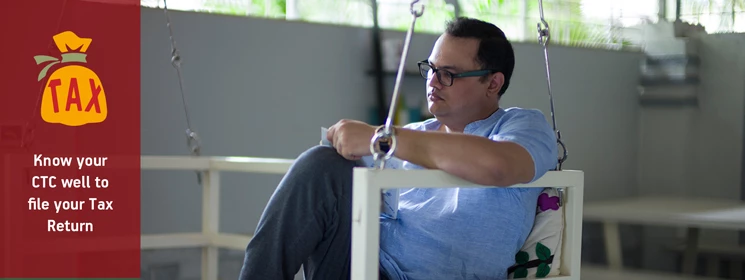-
Our Products
Our FundsFocus Funds
-
Self Care
Self-ServiceFind InformationWays To TransactPartner Solutions
-
Downloads
- Learnings
- About Us
-
More
-
Shareholders
-
Shareholders
-
-
SIP Calculators
- Back
-
Shareholders
Why You Need to Understand Your CTC Before Filing Your Tax Return

Nov 04, 2016
5 mins
4 Rating
Congratulations on your new job! Does that hefty pay-package make you feel like Richie Rich? Have the sounds of the birds and bees been replaced by a ka-ching?! Have you picked out your new car yet?
Yeah, getting paid is pretty great, and it’s all sunshine and rainbows until this happens:
But why does this happen? How come the amount that was credited to your bank account is lesser than what you expected? What did you miscalculate?
We have one word for you: Tax.
Chances are you forgot about the taxes that you need to pay, which can be quite a large chunk of money.
You see, every month, you (unwittingly?) pay tax in the form of TDS or Tax Deducted at Source. which is the amount that is deducted by your employer from your monthly salary and paid to the Income Tax department.
Oh my god, what?!?! Is there any way I can get it back?!
All of it? No.
Some of it? Yes.
Therefore, proper tax planning is important. However, you need not worry as much to the delight of taxpayers the world over, there are various ways of saving tax by availing income tax deduction under different sections of the Income Tax Act, 1961. For instance, under Section 80 C of the Income Tax Act, 1961, you can save up to Rs. 1,50,000 on income tax each year just by investing in tax saving financial products such as PPF, tax saving mutual funds, Bank deposits, etc. Under section 80 D, you can claim deductions for health insurance premiums. Another great way to save on tax is by restructuring your salary.
But my employers have already deducted tax! How can I save tax now?
Enter: Tax Return.
At the start of a new year, your employer gives you a tax declaration form that allows you to specify which tax-saving measures you have undertaken. You are also asked to submit tax-exemption documents such as rent receipts, investment proofs, loan payment certificates, etc. If you share all required information, you can reduce or completely avoid TDS deductions. However, if you are unable to share all the documents in time, your TDS will get deducted.
Not to worry! All you have to do is file for tax returns on or before 31st July of the relevant Assessment Year showing proof that you have taken these tax-saving measures. If they are approved by the Income Tax department, you can get a certain amount of TDS returned to your bank account! Isn’t that awesome!?
So how do I go about filing for tax returns? As the months of June and July come around, you will be given something called Form-16 by your employers. This is a TDS certificate and gives you all the information you need about exactly how much tax has been deducted by your employer. The form comes in two parts: Additionally, you may receive Form 26AS which is a summary of the taxes paid by your company (on your behalf) and any tax deductions you were allowed. Why is it important to know what my salary / income/ CTC before I file for tax returns? To understand that, you need to first know the difference between those 3 terms. As you may have guessed by now, NOT ALL parts of your CTC are taxable. You can save tax simply restructuring your salary to increase the non-taxable parts of it and reducing the taxable parts of it. That’s why they say that a higher salary doesn’t necessarily mean a higher tax liability! To help you understand what parts of your CTC are taxable and which are not, we’ve listed them out for you. Normally, your CTC includes these taxable and non-taxable elements: Conclusion Thus, it is only if you understand exactly how your CTC works that you can successfully carry out tax planning by investing in tax saving investments and file for tax returns and get the excess money you paid as tax, back in your bank account! Ah…. You can almost smell the new car seat, can’t you? Mutual fund investments are subject to market risks, read all scheme related documents carefully.
Similar Articles





 1800-270-7000
1800-270-7000







